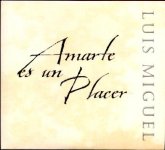| "Amarte Es un Placer" | ||||
|---|---|---|---|---|
 | ||||
| Single by Luis Miguel | ||||
| from the album Amarte Es un Placer | ||||
| Released | 2000 | |||
| Studio | A&M Studios Cello Studios Ocean Way Recording Watersound Record Plant (Hollywood, California)[1] | |||
| Length | 3:31 | |||
| Label | WEA Latina | |||
| Songwriter(s) |
| |||
| Producer(s) | Luis Miguel[2] | |||
| Luis Miguel singles chronology | ||||
| ||||
| Music video | ||||
| "Amarte Es un Placer" on YouTube | ||||
"Amarte Es un Placer" (English: "Loving You Is a Pleasure")[3] is a song recorded by Mexican singer Luis Miguel and the fourth and final single from his album of the same name (1999). Released in 2000, it was written by Juan Carlos Calderón, while production was handled by Miguel. Lyrically, "Amarte Es un Placer" deals with a narrator describing the pleasures of being enamored with his lover.
The song received positive reactions from music critics for its orchestral arrangement and Miguel's delivery. However, both Miguel and Calderón were accused of plagiarism by Mexican composer Marcos Lifshitz who maintained that the melody in the song was derived from his composition "Siento nuestro aliento" and was not credited for it. A court ruled in favor of Lifshitz and ordered Miguel and Warner Music to pay 40% of the song's royalties as compensation. "Amarte Es un Placer" received a nomination for Pop Song of the Year at the 13th Annual Lo Nuestro Awards in 2001 and Calderón received an ASCAP Latin Award in the same year. A music video for the track was directed by Alberto Tolot and was nominated Best Clip of the Year in the Latin field at the 2000 Billboard Music Video Awards. The track peaked at number six Billboard Hot Latin Songs chart in the United States and number five on the Latin Pop Songs chart.
- ^ Miguel, Luis (1999). Amarte Es un Placer (Album liner notes). United States: WEA Latina, a division of Warner Music Group. pp. 1, 8. 3984 29288-2.
- ^ Guerra, Joey (27 September 1999). "Universal Appeal – 3 new CDs capitalize on fascination with Latin music sounds". Houston Chronicle. Hearst Corporation.
- ^ Cite error: The named reference
promiswas invoked but never defined (see the help page).